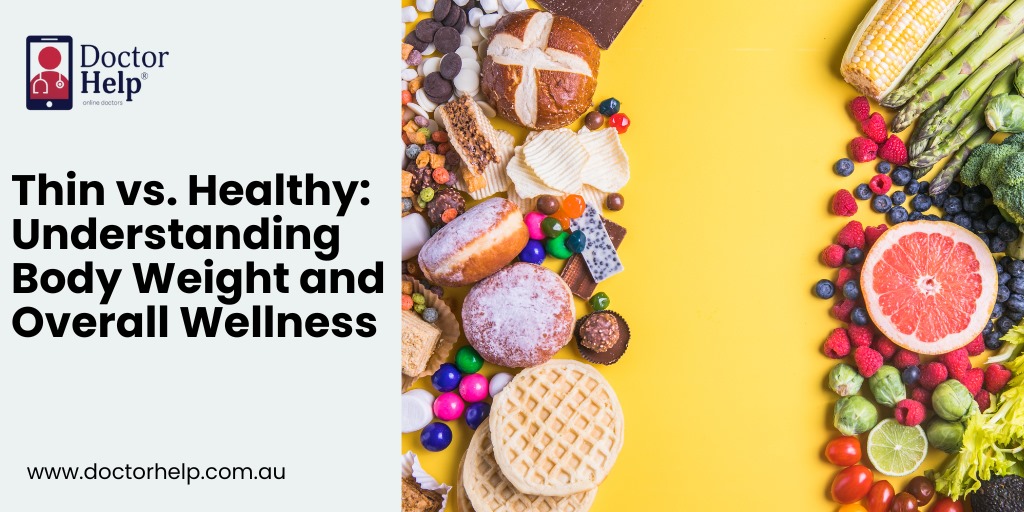Table of Contents
You must have wondered, is a thin body good? Many people assume that being thin means being healthy. But in reality, this is merely a misconception. The answer to the question, “Is there a difference between being thin and being healthy?” is yes. You do not have to be thin to be healthy. Having a lower body weight does not ensure physical wellness. Understanding the difference between being thin and being healthy is significant.
Read on to understand the relationship between body weight and health.
Does weight define health
The definition of health according to the World Health Organization is,
“Health is a state of complete physical, mental and social well-being and not merely the absence of disease or infirmity.”
Our weight does not determine our overall health. Weight is just one of the factors of holistic well-being. So, it cannot be used as a metric to determine how healthy one’s body is. A healthy weight means having low body fat. Sadly, our society has defined health based on body weight. According to our society:
- Thin body = healthy body.
- Thick body = unhealthy body.
A 2016 study has found that nearly 29% of people suffering from obesity are metabolically healthy, meaning they do not exhibit common risk factors like high blood pressure, cholesterol, and cardiovascular disease. On the other hand, many people having normal weight may still face more health risks due to underlying metabolic issues.
Skinny vs healthy
Nowadays, being slender is seen as a sign of physical health. Although being overweight or obese is not good, as you become more likely to suffer from many diseases, it certainly does not mean that being underweight is equal to overall health. Undernourished people are at risk of conditions like weak immune system, anemia, malnutrition, fertility and menstruation issues in females, weak bones (osteoporosis), and cardiovascular disease. Having low body weight could mean your body is lacking minerals and vitamins.
Factors determining the weight
Our body weight depends on many factors:
Metabolism: our weight depends on the metabolism of our body. A person’s body converts calories into energy more quickly if they have a high metabolism. It is difficult for these people to put on weight. Some people have a slow metabolism, which means their body burns calories slowly.
Genetics: our genes also play an essential role in our body weight. It can affect metabolism, the sense of fullness one feels after eating, appetite, and body composition.
Medications: some medicines also affect body weight. They contribute to weight gain as well as weight loss. Medications like antidepressants can cause weight gain, and certain medicines for diabetes can cause weight loss.
Lifestyle factors: your daily habits also influence your weight. How active you are, how much sugar you intake, and how much sleep you get daily can cause weight change.
Sex: your weight change also depends on gender. As observed, hormones like estrogen, progesterone, and testosterone can affect weight change.
Body-fat distribution
Some people are TOFI (thin on the outside and fat on the inside), which means they have high-fat weight and low lean (muscle) mass. So when they measure their weight on a scale, it shows that their weight is normal and their BMI (body mass index) also comes low. However, low BMI does not indicate physical wellness. This condition is also termed MONW (metabolic obesity, normal weight). Such people do not fall under the category of healthy.
People who are thin on the outside and fat on the inside are at a higher risk for high blood pressure, diabetes, cholesterol issues, and cardiovascular diseases. Low muscle mass can lower physical functions, reduce life span, and cause surgical and post-operative complications.
Understanding BMI
BMI measures body weight over height. BMI is further classified into four categories: underweight, normal, overweight, and obese. A person with a normal BMI does not necessarily have a healthy physique because BMI does not evaluate body fat. This syndrome, in which a person may have a significant quantity of visceral fat, is also known as “skinny fat.”
How to maintain a healthy weight
Following is the list of things which you should follow to maintain a healthy weight
- Sleep: get a minimum of 7-8 hours of sleep daily.
- Physical activity: engage in physical activity daily.
- Diet: eat a healthy and balanced nutritious diet.
- Sugar: make your sugar intake less.
- Stress management: practice stress-relieving techniques.
- Protein: add food enriched with protein to your diet.
Conclusion
Thinness is visible and frequently linked to health, while health is multidimensional. It involves many factors, like physical, mental, and emotional. Body fat, muscular mass, and visceral fat determine a healthy weight, often confused with low body weight. Therefore, achieving a healthy weight should be your goal rather than losing weight.
Ask a doctor if you see any weight changes suddenly.
References:
- Constitution of the World Health Organization
- Misclassification of cardiometabolic health when using body mass index categories in NHANES 2005–2012 | International Journal of Obesity
- Healthy ways to gain weight – NHS
- Does Metabolism Matter in Weight Loss? – Harvard Health
- Why people become overweight – Harvard Health
- Drugs Commonly Associated With Weight Change: A Systematic Review and Meta-analysis – PMC
- Factors Affecting Weight & Health – NIDDK
- Obesity: a gender-view – PMC
- BMI
- Implications of Low Muscle Mass across the Continuum of Care: A Narrative Review – PMC










